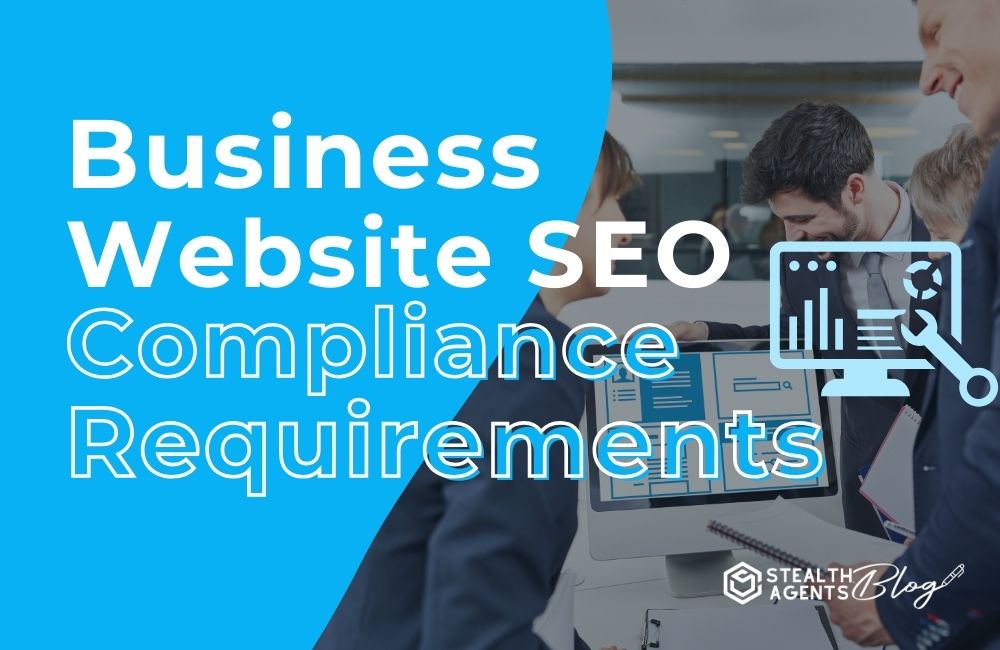In today’s digital landscape, optimizing your business website for search engines is not just beneficial; it’s essential.
With over 93% of online experiences beginning with a search engine, ensuring your site is SEO compliant can significantly enhance visibility and drive growth.
Watch This Video – Click Here To Hire Our SEO Virtual Assistants Here
Here’s a comprehensive guide to the critical SEO compliance requirements you need to implement in 2024.
Understanding SEO Compliance

SEO Compliance is the art and science of adhering to the principles and parameters set forth by search engines to enhance a website’s visibility.
It isn’t just about peppering your content with keywords (though that certainly plays a role).
It’s a symphony of elements working together to form a user-friendly, authoritative, and high-performing web resource.
Without this compliance, your online ambitions are akin to setting sail without a compass—you’ll drift about in the endless sea of content, invisible to all but the most fortuitous of internet travelers.
Benefits of SEO Compliance for Websites
Visibility and Traffic:
It’s the basic formula—an optimized website equals higher search ranking, and higher search ranking equals more clicks.
With good SEO compliance, your website has better chances of being seen by more people.
Visibility is the key to generating organic traffic, which means getting visitors from search engines without spending any money on ads.
*advertisement*
Tired & Overwhelmed With Administrative Tasks?
Hire A Top 1% Virtual Assistant From Stealth Agents!

Sign Up Below & Hire A Top 1% Virtual Assistant
Rated 4.7 Stars Serving Over 2,000+ Customers.
Hire Top 1% Virtual Assistants For $10-$15 Per Hour
Ask About Our 14 Day Trial!
*advertisement*
The higher your visibility is, the more traffic you can potentially get.
User Experience:
Better SEO equates to a more user-friendly site, resulting in longer visits, lower bounce rates, and more engaged visitors.
When a website is optimized for SEO, it becomes easier to navigate and find relevant information.
This leads to a positive user experience and increases the chances of converting visitors into customers.
By providing a seamless user experience, you can build trust and credibility with your audience, which can translate into higher engagement and conversions.
Credibility and Authority:
High ranks mean that search engines see you as an authority, which in turn, fosters trust with your online audience.
A website that consistently appears on top of search results is perceived as a credible source of information.
When users trust your website, they are more likely to engage with your content and share it with others.
This can significantly boost your brand’s reputation and establish you as an industry leader.
Key SEO Compliance Requirements
1. Mobile Optimization
With mobile devices generating approximately 60% of global website traffic, a mobile-friendly website is no longer optional.
Ensure your site is responsive, which means it automatically adjusts to fit the screen size of any device, providing an optimal user experience.
Google’s mobile-first indexing also prioritizes mobile-optimized sites, making this a crucial factor for SEO success.
2. Secure Socket Layer (SSL) Certification
Security is a top priority for both users and search engines.
An SSL certificate encrypts data transferred between your website and its users, safeguarding sensitive information.
Since 2014, Google has considered HTTPS as a ranking signal, emphasizing the importance of security in SEO strategies.
3. Page Speed Optimization
Page speed is a direct ranking factor. A slow-loading website not only harms your SEO rankings but also affects user experience.
According to Google, as page load time goes from one to five seconds, the probability of a bounce increases by 90%.
Ensure your website is optimized for speed by compressing images, leveraging browser caching, and minimizing code.
4. Schema Markup Implementation
Schema markup is a code that you put on your website to help search engines return more informative results for users.
Implementing schema markup can enhance your website’s visibility on search engine results pages (SERPs) through rich snippets, potentially increasing click-through rates.
5. Accessibility and User Experience (UX)
Ensuring your website is accessible to all users, including those with disabilities, is not only a best practice but increasingly a component of SEO.
Websites that are easily navigable and readable tend to perform better in SERPs.
Factors such as clear navigation, readable fonts, and color contrast all contribute to a better user experience and SEO.
6. Quality Content and Keywords
The backbone of SEO, high-quality, relevant content matched with well-researched keywords, helps to attract and engage the right audience.
In 2024, focus on creating valuable content that addresses your audience’s needs and incorporates keywords naturally and strategically throughout the text.
7. Regular Website Audits
Conduct regular SEO audits to identify and rectify issues like broken links, outdated content, and SEO non-compliance.
These audits help maintain your site’s health and ensure continuous alignment with SEO best practices.
Does Small Businesses Website need SEO compliance?
SEO compliance is crucial for small businesses. It enhances website visibility and ranking, driving more traffic and conversion opportunities.
A high-ranking website builds credibility and trust among potential customers.
SEO also improves user experience, leading to higher conversion rates. Additionally, it provides a competitive edge and is a cost-effective marketing strategy.
Therefore, in the digital age, an SEO compliant website is not merely beneficial – it’s a necessity for small business success.
And speaking of success for small businesses, check out this blog, Top 15 Virtual Assistant Companies For Small Businesses, for a top-notch virtual assistant SEO specialist.
What tools can I use to help maintain my website’s SEO compliance?
Google Search Console:
This free tool from Google helps you monitor and troubleshoot your website’s presence in Google Search results.
It helps you understand how Google sees your site and optimize its performance in search results.
With this tool, you can submit sitemaps, check for crawl errors and duplicate content, and even request Google to index new or updated pages.
SEMrush:
This is a comprehensive SEO tool that helps you perform keyword research, track keyword ranking, check backlinks, run SEO audits of your blog, and much more.
It also offers competitor analysis and allows you to monitor your website’s traffic, giving you insights into how well your SEO strategies are working.
SEMrush is a popular tool among SEO experts and is constantly updating its features to stay ahead of search engine algorithm changes.
Moz Pro:
Moz Pro offers a suite of SEO tools including keyword research, link building, site audits, and page optimization insights to help you build an effective SEO strategy.
The software also provides data visualizations to help you track your website’s performance and identify areas for improvement.
Screaming Frog SEO Spider:
This website crawler allows you to crawl websites’ URLs and fetch key elements to analyze and audit technical and onsite SEO.
It provides detailed reports on factors such as page titles, meta descriptions, headings, and more.
Ahrefs:
Known for its backlink analysis, Ahrefs also offers tools for keyword research, content research, rank tracking, and web monitoring.
It is a comprehensive SEO tool that can help you identify and fix any potential issues with your website’s SEO.
Ahrefs also has a user-friendly interface and provides in-depth analysis for your website’s performance.
Yoast SEO:
If your website is on WordPress, the Yoast SEO plugin is a great tool for managing your website’s SEO.
It allows you to easily optimize your website’s content, meta tags, and images for search engines.
The plugin also provides a readability analysis to help improve the overall quality of your content.
Takeaways
By integrating these SEO compliance requirements into your website strategy, you can significantly improve your site’s search engine ranking and visibility.
Staying compliant not only boosts your SEO efforts but also enhances the overall user experience, paving the way for increased engagement and conversions.










